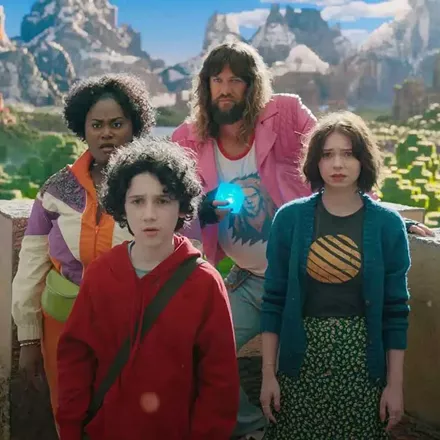
- Sony Pictures
You might reasonably assume that one of the baseline responsibilities for a filmmaker is allowing viewers to understand what the hell is happening while they're watching—that is, if so much of 21st-century filmmaking weren't evidence to the contrary.
It's hard to pinpoint when the epidemic began, particularly as it applies to action filmmaking, but it has consisted of chaotic editing, underlit cinematography and a general sense that having things move fast is a more crucial artistic goal that having things be comprehensible.
I fear overselling Gran Turismo, because it's not a particularly great movie. Its fact-based story is less the stuff of action spectacle than it is of underdog-sports drama, with all of the requisite formulaic elements thereof, and on top of that it's kind of a bald-faced bit of synergistic corporate advertising for PlayStation and Nissan. But it's still significant that director Neill Blomkamp (District 13) does things that feel almost radical and revolutionary in 2023. He prioritizes the simple need for us, the viewers, to know what's going on during scenes where cars are zipping along at 200-plus miles per hour.
The tale begins with young Jann Mardenborough (Archie Madekwe) at home in Cardiff, Wales, where he has become a master at the auto-racing simulator game Gran Turismo. Conveniently, his rise to excellence coincides with a radical promotional idea concocted by Nissan marketing executive Danny Moore (Orlando Bloom): recruiting some of the best simulator players from around the world and giving them a chance to drive real cars in real races. And thus Jann is gathered with several other prospective drivers at an academy under the tutelage of ex-driver/chief engineer Jack Salter (David Harbour), with only one of the recruits getting a chance to head out onto the actual pro racing circuit.
Jann's journey towards that big opportunity is complicated by lack of support from his father (Djimon Hounsou), an ex-footballer who doesn't understand the kids these days with their video games and whatnot. It's a clunky bit of obligatory conflict in the screenplay by Jason Hall and Zack Baylin, in the same way that the snippet of a sub-plot involving Jann's romantic interest (Maeve Courtier-Lilley) simply feels like a waste of time. Stories like this have beats to hit, but that doesn't mean they need to hit all of those beats with a hammer.
Yet another component of these stories is the "down-on-his-luck coach whose supervision of our hero becomes an opportunity for his own redemption," and at least here Gran Turismo hits a more than functional note.
Harbour's performance is actually quite delightful, somehow taking the arc we know is coming from the moment he appears—a journey from gruff, reluctant mentor to concerned surrogate father-figure—in a direction that feels frisky and satisfying. Even the inevitable speech in which he explains the reason for his own never-reached potential feels imbued with a distinctive energy, an almost matter-of-fact realization that some of us just don't get that shot at greatness, but by God he's gonna help Jann get there if he can.
None of that would matter without the race sequences that are the movies centerpiece, and auto racing can be a real pain in the ass to get an audience to follow. But Blomkamp makes a few great strategic choices from the outset that allow the progress of those races to remain clear. First, he puts Jann's primary adversary—cocky driver Nicholas (Josha Stradowski), basically the "Johnny from The Karate Kid" of our story—in a shiny gold car, making it easy to spot him at any given moment, and similarly places another key rival in a car with a rainbow stripe. Then, he embraces the narrative's video-game roots by keeping the on-screen graphics focused on Jann's current rank in any given race. The result is a fast-paced scenario that permits the same clarity as, say, a baseball movie where you're always clear on the balls-and-strikes count and what inning it is.
Gran Turismo isn't always deft enough to combine its basic genre pleasures with potentially interesting thematic ideas, like the notion that Jann's lack of obvious sports-hero charisma could have torpedoed him before he even had a chance. It is, however, solid enough at giving you a reason to cheer for the underdog's successes. And perhaps more significantly, it cares about giving you a way to know when you've actually seen one of those successes.


